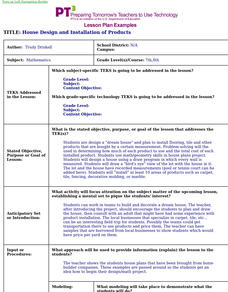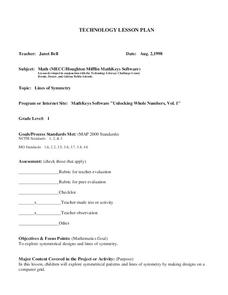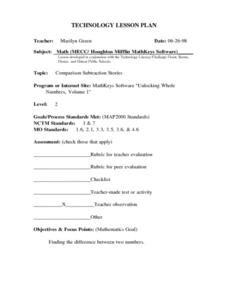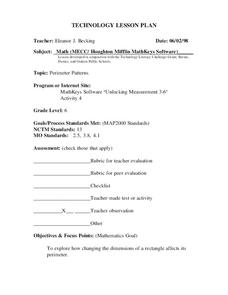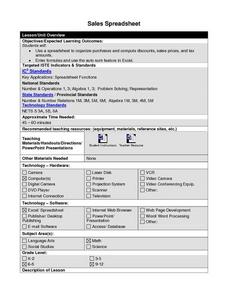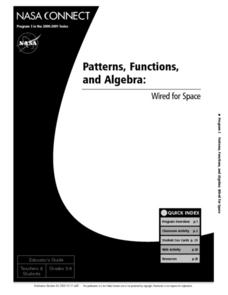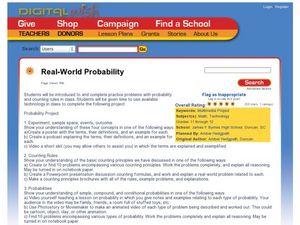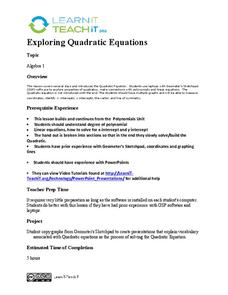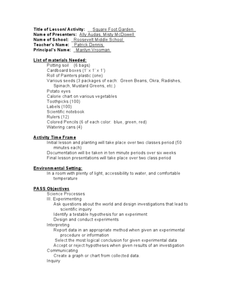Curated OER
House Design and Installation of Products
Students design a "dream house" and plan to install flooring, tile and other products that are bought by a certain measurement. Problem solving be used in determining how much of each product to use and the total cost of each installed.
Curated OER
The Geometry of Circles
Learners review the parts of a circle, calculate the circumference and area of a circle, and create student-made tests on the geometry of circles using educational software.
Curated OER
TE Activity: Northward Ho!
Students design a simple compass. They examine how the Earth's magnetic field has both horizontal and vertical components. They determine how a compass works and work with cardinal directions.
Curated OER
How to be a Great Navigator!
Students examine historical methods of navigation. They discuss the techniques of "Dead Reckoning," "Heaving the Log," and "Chip Log," pretend to sail from Europe to North America using vectors and determine the location of their...
Curated OER
Making Cents of Density
Middle schoolers utilize their knowledge of the physical properties of matter such as mass, volume, and density to solve a problem. They utilize the scientific method to solve a problem. Pupils analyze their data to determine whether...
Curated OER
Wildlife Management
Students examine the effects of various management strategies on the size of wildlife populations. Each student simulates the management of an animal population in a card game, graphs the results of the wildlife game, and participate in...
Curated OER
Pythagorean Theorem
Eighth graders draw right triangles and identify the parts of a right triangle: right angle, interior and exterior angles, hypotenuse and legs. They predict and identify any relationships that exist between the sides of a right...
Curated OER
Lines of Symmetry
First graders create symmetrical designs using a computer program. In this lines of symmetry lesson, 1st graders review their symmetrical designs and discuss other ways symmetrical designs can be made. Students work in pairs and use...
Curated OER
Trading in Subtraction
Second graders solve two-digit subtraction problems without trades using counters and by modeling trades with base-ten blocks. They pair in groups and students open the "Counters Open Mat". Students are given a problem, such as: there...
Curated OER
Comparison Subtraction Stories
Second graders create stories that model comparison subtraction while using the environmental mats. They suggest situations in which they compare numbers. For example, if one student has 6 nickels and another child has 14 nickels,...
Curated OER
Perimeter Patterns
Sixth graders calculate perimeter of rectangles with different dimensions. In this perimeter lesson, 6th graders define length, width and perimeter. Students complete a perimeter activity using a web tool to change the dimensions of...
Alabama Learning Exchange
I'm Lovin' It: Finding Area Between Curves
Learners explore the concept of finding the area between two curves. In this finding the area between two curves instructional activity, students model the logos of McDonalds, Nike, and Motorola on grid paper. Learners find functions to...
Curated OER
Pythagorean Theorem Spreadsheet
Studetns use a spreadsheet to organize data on the sides of a triangle. They use the Pythagorean Theorem and the If then spreadsheet function to decide whether the three sides determine a right triangle. Middle schoolers work...
Curated OER
Sales Spreadsheet
Students use Excel spreadsheets to organize purchases, discounts, sales prices, and sales tax. Students follow step by step instructions and enter formulas as well as use the auto sum feature to calculate required calculations.
Curated OER
How to Graph in Excel
Fourth graders construct data graphs on the Microsoft Excel program. In this statistics instructional activity, 4th graders formulate questions and collect data. Students represent their results by using Excel.
Curated OER
Excel for Beginners
In this Excel lesson, learners set a formula to check their homework. Students also use clipart, work in groups, and learn to use the tools in the drop-down list.
Curated OER
Shapes and Colors All Around
Students tour their school in a scavenger hunt to find primary colors and two and three-dimensional shapes. Students take digital pictures of the colors and shapes they find and create a class book of the pictures.
Curated OER
By Land, Sea or Air
Learners learn navigational techniques change when people travel to different places. They understand differences between navigation on land, water, air and in space. They explain the concept of dead reckoning as it applies to...
Curated OER
How Much Does That Car Cost?
Students calculate how much it costs to buy a used car and finance it through a bank. They select a car from the newspaper, conduct Internet research on current auto loan interest information for four different states, and create a...
Curated OER
Patterns, Functions, and Algebra: Wired for Space
Students assess how patterns, functions and algebra can assist NASA engineers design new ways of propelling spacecrafts. They explore how electricity and magnetism are replacing the fuel-consuming rocket propulsion. Electromagnetism is...
Curated OER
Real-World Probability
Learners explore the concept of probability. For this probability lesson, students create a video, poster, or podcast explaining what experiments, sample space, events, and outcomes are in relation to probability. Learners create a...
Curated OER
Exploring Quadratic Equations
Eleventh graders explore quadratic equations. In this Algebra II lesson plan, 11th graders use Geometer’s Sketchpad to explore the properties of quadratics and the connections with polynomials and linear equations. The lesson plan is...
Curated OER
Square Foot Garden
Students plant a garden and keep track of it. In this geometrical garden lesson plan, students collect data from their garden twice a week. They graph their finding and figure out how many square feet of growing space each person needs...
Curated OER
How Do Things Fall?
Students study forces by examining the force of gravitational attraction. They observe how objects fall and measure the force of gravitational attraction upon objects. Students discover that, since gravitational constants are different...


